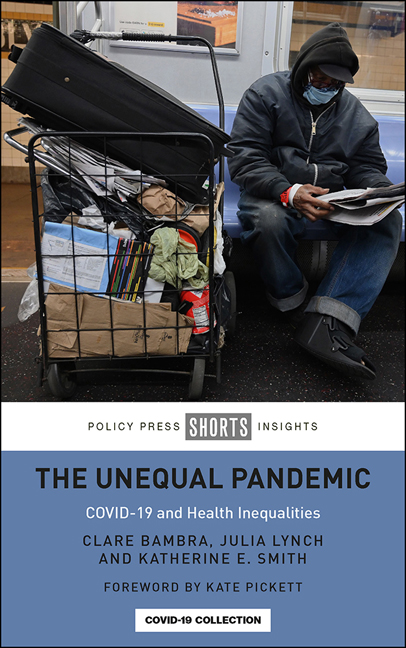Book contents
- Frontmatter
- Contents
- List of figures and tables
- About the authors
- Acknowledgements
- Foreword
- Preface
- one Introduction: perfect storm
- two Pale rider: pandemic inequalities
- three Collateral damage: inequalities in the lockdown
- four Pandemic precarity: inequalities in the economic crisis
- five Pandemic politics: inequality through public policy
- six Conclusion: health and inequality beyond COVID-19
- Notes
- References
- Index
Foreword
Published online by Cambridge University Press: 04 January 2022
- Frontmatter
- Contents
- List of figures and tables
- About the authors
- Acknowledgements
- Foreword
- Preface
- one Introduction: perfect storm
- two Pale rider: pandemic inequalities
- three Collateral damage: inequalities in the lockdown
- four Pandemic precarity: inequalities in the economic crisis
- five Pandemic politics: inequality through public policy
- six Conclusion: health and inequality beyond COVID-19
- Notes
- References
- Index
Summary
I am writing this during the short dark days between Christmas and New Year at the end of a strange and difficult year, a year in which practitioners of my discipline, epidemiologists, have come to unexpected prominence and recognition. Epidemiology is the study and analysis of the distribution, patterns and determinants of health, disease and wellbeing in populations (rather than individuals). The word derives from the Greek ‘epi’: on or upon, and ‘demos’: the people, so in essence, ‘what befalls the people’. What has befallen us during 2020 has often been described as an unprecedented global challenge, and yet human history has, time and again, been plagued by epidemics and pandemics – from the Antonine Plague in 165 AD (thought to be smallpox), through the Black Death in 1350, the devastation of the indigenous populations of the Americas after they came into contact with Europeans, the Great Plague of London in 1665, the 1918 Spanish flu and the worldwide ravages of HIV/ AIDS since the 1980s, just to name a few.
Our science of epidemiology, as it seeks to understand both the causes and the consequences of states of health and disease, underpins practice and action that promotes and protects the people's wellbeing. And historically our science has never been confined to the laboratory or the hospital; it has been handin-glove and inextricably intertwined with social justice and human rights campaigning, from the earliest interventions to improve sanitation and protect child labourers in the squalid cities of the Industrial Revolution to the high-level policy that will determine the likelihood of equitable distribution of COVID-19 vaccinations across the globe. Our epidemiological science and our public health practice are nothing if they do not reach all the people of the world, including all those who are ‘othered’, such as the poor, the marginalised and the dispossessed.
Throughout 2020 we have been told repeatedly by political leaders that they are ‘following the science’. This is a welcome pivot from being told that ‘the people of this country have had enough of experts’, even if the shift is to some extent an attempt to evade responsibility and accountability for the suffering caused by the responses to the COVID-19 pandemic, including lockdowns and closures of schools and workplaces.
- Type
- Chapter
- Information
- The Unequal PandemicCOVID-19 and Health Inequalities, pp. x - xiiPublisher: Bristol University PressPrint publication year: 2021



